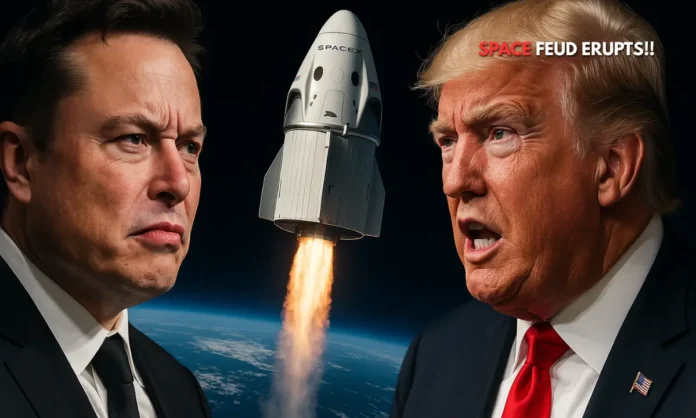SUMMARY
- Elon Musk announced the shutdown of NASA’s only crewed spacecraft, then reversed course hours later after public backlash.
- The move came amid escalating tensions with President Trump over a tax-and-spending bill and threats to cancel federal contracts.
- Spaceflight, lunar missions, and billions in government contracts now hang in the balance as Musk and Trump lock horns.
A Space Standoff That Spun Into a National Crisis
The Elon Musk–Donald Trump feud took a perilous turn this week, casting a shadow over America’s most critical space missions. At the center of the storm: SpaceX’s Dragon spacecraft, the only U.S. vehicle currently capable of ferrying astronauts to and from the International Space Station. What began as a war of words over tax subsidies quickly escalated into one of the most consequential stand-offs between the White House and a private contractor in U.S. history.
Just days after being hosted at a high-profile Oval Office farewell for stepping down from the cost-cutting Department of Government Efficiency (DOGE), Musk publicly threatened to “decommission” the Dragon capsule—hours after Trump suggested cutting billions in subsidies to his companies. Though Musk quickly walked back his announcement under public pressure, the damage was done. Stock markets rattled, NASA’s contingency plans were thrown into chaos, and confidence in both Musk and Trump took a hit.
Amid rising tensions, the political and economic stakes go far beyond one spacecraft. What’s unfolding is a test of how far a billionaire innovator and a populist president will go when their visions—and egos—collide in full public view.
Elon Musk's feud with #Trump led to a threat to decommission @SpaceX Dragon spacecraft, critical for NASA’s ISS missions. He later retracted, highlighting the program's importance. The dispute risks $22B in contracts. @dwnews pic.twitter.com/HAlBTwoXbt
— Paul Ethan 🇬🇧🇪🇺 (@I_Paul_Ethan) June 7, 2025
The Only Way Up Now Comes with a Political Price
- SpaceX’s Dragon is the only American-made crew capsule currently servicing the ISS.
- NASA has a $4.9 billion contract with SpaceX for astronaut transport and ISS operations.
- Boeing’s Starliner is still under testing; Russia’s Soyuz is the only fallback.
The Dragon spacecraft isn’t just a technological marvel—it’s a geopolitical asset. With NASA’s Artemis III moon mission hinging on Musk’s broader Starship platform, and with Boeing’s Starliner facing repeated delays, a decommissioned Dragon would ground America’s space ambitions almost instantly. Even NASA’s 2030 ISS deorbit plan—slated to be executed by SpaceX—is now in jeopardy.
Elon Musk’s momentary pullback—spurred by an X user’s plea to “take a step back”—highlighted the thin line between bold leadership and reckless brinkmanship. NASA offered a terse statement, reiterating its commitment to “industry partners.” But beneath that diplomatic language is a harsh truth: America has no Plan B. If Dragon goes, so does the country’s crewed access to space.
Trump’s retaliatory messaging on Truth Social hinted at deeper cuts: “Terminate Elon’s government subsidies,” he wrote, casting doubt on future collaboration. Meanwhile, Tesla’s share price nosedived nearly 8%, reflecting investor anxiety over a war neither side can afford to escalate.
Billionaire Backlash and the Echo Chamber of Power
- Musk accused Trump of being mentioned in the Epstein files, further inflaming tensions.
- Trump countered that Musk had no problem with the bill “until his subsidies were cut.”
- Musk reminded Trump he donated nearly $300 million to his 2024 campaign.
The animosity isn’t just personal—it’s systemic. Musk, who once publicly backed Trump’s re-election with an eye-watering $300 million campaign donation, now finds himself in open rebellion against the same president he helped elect. Their feud is being watched not just by Wall Street and Silicon Valley but also by global allies, intelligence partners, and rival space programs in China and Russia.
More troubling is the theatrical nature of the spat. From memes comparing the feud to a “Mean Girls” sequel to Elon’s veiled Epstein allegations, the digital spectacle is morphing into a reputational disaster. For every satirical post online, there’s a real-world stakeholder watching American leadership fracture in real time.
This isn’t just another Musk drama. It’s an inflection point for how much control a single billionaire can—and should—wield over vital national infrastructure.
“Team America” or Team Chaos?
What began as a regulatory disagreement is now a full-blown crisis in American space policy. The spectacle surrounding the Dragon spacecraft shutdown may have ended in a Musk backpedal and a patriotic post of “Team America,” but the fundamental issues remain unresolved.
When political grudges and tech titan egos hijack national space strategy, everyone—from astronauts in orbit to engineers on Earth—gets caught in the crossfire. The Musk–Trump rupture doesn’t just threaten future missions; it challenges the very architecture of U.S. public-private partnerships.
Both men are now on collision courses with history. And if their rockets misfire, the fallout won’t be virtual.


